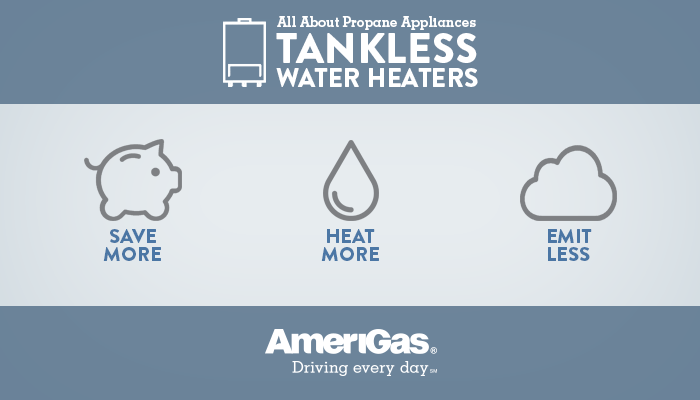Due to their on-demand properties, tankless water heaters eliminate the “standby losses” that occur in storage tank water heaters. These standby losses arise when the storage tank loses energy to the surrounding environment, requiring the water in the tank to be re-heated.
Unlike standard electric or heating oil storage tank water heaters, propane tankless systems only heat water when you actually need it. Find out how propane tankless water heaters stack up against the competition!
Propane vs. Electric
They may be small in size, but propane tankless water heaters are big on performance. Saving an average of 12 sq. ft. of floor space compared to electric storage tank units, propane tankless water heaters still manage to outperform electric storage tank water heaters. Propane tankless water heaters average 222 gallons of hot water per hour; where as a 50-gallon electric storage tank water heater averages a mere 64 gallons.
Compared to an electric storage tank water heater, a tankless propane water heater will save you more than $150 per year in energy costs. And when you go tankless with propane, you’re energy bill won’t be the only thing that drops. Propane tankless water heaters produce 50% less CO2 emissions than electric storage tank water heaters. Best of all, propane tankless systems also qualify for credits and rebates worth hundreds of dollars!
Propane vs. Heating Oil
Unlike tankless water heaters powered by propane, heating oil storage tank water heaters aren’t eligible for Energy Star qualification. Energy Star qualified propane tankless systems offer improved efficiency while reducing your household’s carbon footprint.
Compared to a heating oil system, a propane tankless water heater will reduce your energy bill by more than $200 per year. And propane doesn’t stop there—propane tankless water heaters also produce 33% fewer CO2 emissions than heating oil systems. What could be better than reducing your energy bills and your household’s carbon footprint? In short: nothing!
Propane Appliances Go to blog list page filtered for the category

